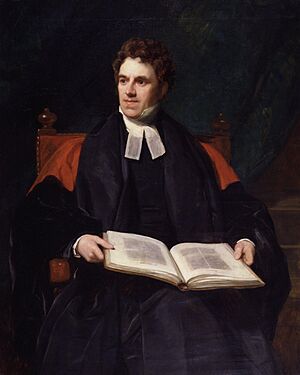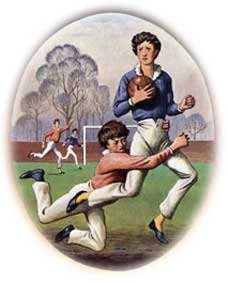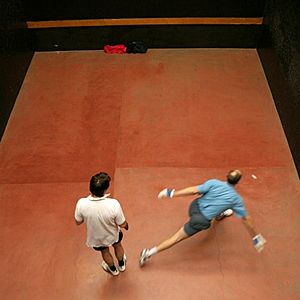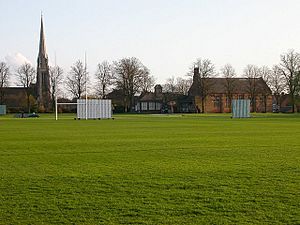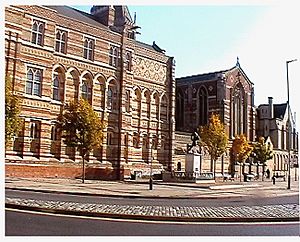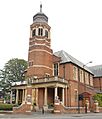Rugby School facts for kids
Quick facts for kids Rugby School |
|
|---|---|
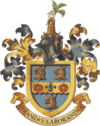 |
|
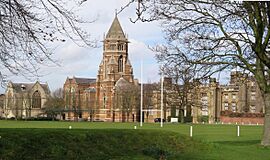
Rugby School, seen from 'The Close' playing field.
|
|
| Address | |
|
Lawrence Sheriff Street
, CV22 5EH
England
|
|
| Coordinates | 52°22′03″N 1°15′40″W / 52.3675°N 1.2611°W |
| Information | |
| Type | Private boarding school in the UK |
| Motto | Latin: Orando Laborando (through work and through prayer) |
| Religious affiliation(s) | Church of England |
| Established | 1567 |
| Founder | Lawrence Sheriff |
| Sister school | Rugby School Thailand Rugby School Japan |
| Department for Education URN | 125777 Tables |
| Executive Head Master | Peter Green |
| Head | Gareth Parker-Jones |
| Gender | Co-educational |
| Age | 13 to 18 |
| Enrolment | 865 |
| Capacity | 885 |
| Houses | 16 |
| Colour(s) | Duck Egg Blue |
| Alumni | Old Rugbeians (ORs) |
| School song | Floreat Rugbeia |
Rugby School is a private boarding school in Rugby, Warwickshire, England. It's for students aged 13 to 18.
The school started in 1567 as a free grammar school for local boys. It is one of the oldest independent schools in Britain. From 1828 to 1841, Thomas Arnold was the Headmaster. He helped make the school famous and set an example for other Victorian public schools. Rugby School was one of nine schools looked at by the Clarendon Commission in 1864. It was later included in the Public Schools Act 1868. Originally, only boys attended. However, it became fully co-educational in 1992, meaning both boys and girls could attend.
Many famous people have studied at Rugby School. These include a UK prime minister, a French prime minister, bishops, poets, scientists, writers, and soldiers. These former students are called "Old Rugbeians".
Rugby School is also famous as the place where rugby football was invented!
Contents
School History
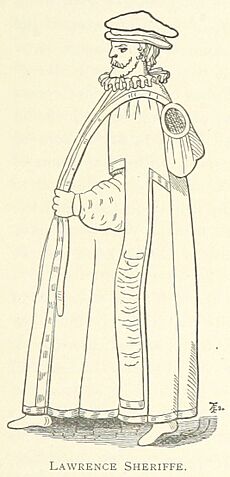
How Rugby School Started
Rugby School was founded in 1567. This happened because of the will of Lawrence Sheriff. He made a lot of money by supplying groceries to Queen Elizabeth I of England. Sheriff wanted his money to be used to create almshouses (homes for the poor) and a free grammar school. This school was mainly for children from Rugby and Brownsover, and then for children from nearby areas.
Sheriff later changed his will. He left his eight-acre Conduit Close estate in Middlesex to the school instead. At first, this seemed like a bad deal. The estate was just undeveloped farmland outside London. But over time, this land became very valuable as London grew. This made Rugby School a very rich institution. Today, the Rugby Estate includes parts of Great Ormond Street, Lamb's Conduit Street, and Rugby Street in London.
Early Years and Growth
For a long time, until 1667, the school was not very well known. There were legal challenges over Sheriff's will from his relatives. But in 1667, a final decision was made that supported the school. After this, the school began to grow steadily.
Under the Headmaster Henry Holyoake (1688 to 1731), the school became important beyond just the local area. By the end of the 17th century, students from all over England were coming to Rugby School.
The school first started in a wooden building on Church Street. By the 1740s, this building was old and in poor condition. So, in 1750, the school moved to its current location. It bought a former Manor House, which became the Master's house. A new schoolhouse was built next to it. The buildings you see today were mostly built in the 19th and early 20th centuries.
The Great Rebellion of 1797
Henry Ingles was Headmaster from 1794 to 1806. He was known for being very strict. In 1797, a big event called the 'Great Rebellion' happened. It started when a boy was punished unfairly. The students got very angry. They broke windows and burned furniture. Since other teachers were away, Ingles asked for help from the town. Soldiers and townsfolk came to stop the students. The students retreated to an island in the school grounds. The soldiers then captured them.
The Victorian Era
Rugby School's most famous Headmaster was Thomas Arnold. He led the school from 1828 to 1841. He focused on teaching good morals and religious principles. His ideas were very popular and became a model for other public schools in the Victorian era. Arnold's time at Rugby is famously described in Thomas Hughes's 1857 book Tom Brown's School Days.
In 1845, some Rugby schoolboys wrote down the "Laws of Football as Played At Rugby School." This was the first time rules for any type of football were officially written down.
In the late 1800s, students were divided into "Foundationers" and "Non-Foundationers." Foundationers were local boys who got free schooling, as Lawrence Sheriff had intended. Non-Foundationers were students from outside Rugby who paid fees and lived at the school. As the school became more famous, more fee-paying students joined. So, in 1878, a new school called Lawrence Sheriff School was founded. This school continued Sheriff's original idea of a free school for local boys.
The French educator Pierre de Coubertin visited Rugby School several times in the late 19th century. He later said the school was a big inspiration for him. He went on to found the modern Olympic Games in 1896.
Modern History
In 1975, two girls joined the sixth form (the oldest students). The first house for girls opened three years later. By 1992, the school became fully co-educational. This meant 13-year-old girls could join. In 1995, Louise Woolcock became Rugby's first-ever Head Girl. Today, about 800 students attend the school. The BBC's changing places video gives a good look into life at the school.
Overseas Branches
Rugby School has expanded internationally. In 2017, it opened its first overseas branch in Thailand, called Rugby School Thailand. In 2023, another branch opened in Kashiwa, Chiba Prefecture, Japan, named Rugby School Japan.
Rugby Football
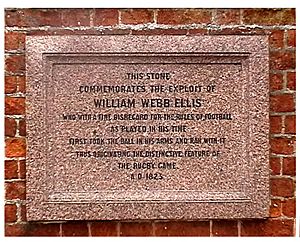
The game of Rugby football got its name from Rugby School.
There's a famous story about William Webb Ellis. A plaque on the school grounds remembers him. The story says he was the first person to pick up the football and run with it during a game. This is how the new sport supposedly began. However, this story comes from Matthew Bloxam, a former student who heard it from a friend. Webb Ellis had already passed away when the story was first written down.
Richard Lindon, a shoemaker near the school, is credited with inventing the oval-shaped rugby ball. He also created the rubber inflatable bladder and the brass hand pump for it.
When Webb Ellis was at Rugby (1816–1825), there were no official rules for football. The students organized the games themselves. The rules were based on tradition and often changed with each new group of students.
Rugby Fives
Rugby fives is a handball game. It's similar to squash and is played in an enclosed court. It's like other games called Fives, such as Winchester fives and Eton fives.
Many believe Rugby fives came from Wessex fives. Thomas Arnold, the Headmaster of Rugby, played Wessex fives when he was a boy.
In Rugby fives, two players (singles) or two teams of two players (doubles) play against each other. The goal is to hit the ball above a 'bar' on the front wall. The other team must not be able to return it before it bounces twice. The ball is a bit bigger than a golf ball. It's hard and covered in leather. Players wear leather padded gloves on both hands to hit the ball.
Rugby fives is still popular today. Tournaments are held across the country, organized by the Rugby Fives Association.
Cricket
Rugby School has produced many cricketers who have gone on to play Test and first-class cricket. The school's cricket ground has hosted important matches. For example, in 2013, Warwickshire played Glamorgan in a Twenty20 match. In 2015, Warwickshire played Sussex in a one-day match. In that 2015 match, William Porterfield scored exactly 100 runs. Warwickshire returned to Rugby School in 2024 to play three matches.
School Houses
Rugby School has both day students and boarding students. Most students are boarders. The school was originally only for boys. Girls were first admitted to the sixth form in 1975. It became fully co-educational in 1992. The school community is divided into different houses.
| House | Founded † | Girls/Boys |
|---|---|---|
| Cotton | 1836 | Boys |
| Kilbracken | 1841 | Boys |
| Michell | 1882 | Boys |
| School Field | 1852 | Boys |
| School House | 1750 | Boys |
| Sheriff | 1930 | Boys |
| Town House | 1567 | Boys (Day) |
| Whitelaw | c.1790 | Boys |
| Bradley | 1830 (1992) | Girls |
| Dean | 1832 (1978) | Girls |
| Griffin | 2003 | Girls |
| Rupert Brooke | 1860 (1988) | Girls |
| Southfield | 1993 | Girls (Day) |
| Stanley | 1828 (1992) | Girls |
| Tudor | 1893 (2002) | Girls |
- † Numbers in brackets indicate date of conversion to a Girls' house where applicable
Academic Life
Students starting at Rugby in the F Block (their first year) study many different subjects. In their second year (E block), they choose nine subjects for their GCSEs. This continues into the D Block (GCSE year). The school then offers standard A-levels in 29 subjects. Older students can choose to take three or four subjects. They can also do an extended project. The school also offers the IB Diploma Programme. In 2023, 68% of students who took A-levels at Rugby School scored A*/A. Also, 83% of GCSE students scored 9/7.
Scholarships
The Governing Body helps families with school fees if they cannot afford them. Students who receive a Scholarship can get a 10% discount on fees. A student can even be awarded more than one scholarship.
Fees
- Boarder fees per term: £13,970
- Day pupil fees per term: £8,770
Notable Alumni
Many famous people have attended Rugby School. These include William Webb Ellis, who is said to be the father of rugby. Other notable alumni include Tom Wills, who invented Australian rules football. War poets Rupert Brooke and John Gillespie Magee, Jr. also studied here. Former Prime Minister Neville Chamberlain and author Lewis Carroll are also Old Rugbeians. The author Salman Rushdie attended the school. The Indian concert pianist Adnan Sami also studied at Rugby School.
Matthew Arnold was a poet and critic whose father, Thomas Arnold, was a Headmaster of the school. Sir Philip Henry Manson-Bahr was a zoologist and doctor who served in World War I. He later became president of important medical societies. Richard Barrett Talbot Kelly joined the army after leaving school in 1915. He earned a Military Cross during the First World War. He later returned to Rugby School as the Director of Art. The diplomat Sir Frank Kenyon Roberts was a student at Rugby in the 1920s.
Rugbeian Society
The Rugbeian Society is for former students of Rugby School. A former student is often called an OR, which stands for Old Rugbeian.
The society helps former students stay in touch with each other. It also strengthens the connection between Old Rugbeians and the school.
Buildings and Architecture
The buildings at Rugby School were built in the 18th and 19th centuries. Some additions were made in the early 20th century. The oldest parts are the Old Quad Buildings and the School House. These date back to 1748, but most were built between 1809 and 1813. They were designed by Henry Hakewill and are important historical buildings.
Many of the school's well-known buildings are from the Victorian era. They were designed by William Butterfield. The most famous is the chapel, built in 1872. It has an octagonal tower that is 138 feet (42 meters) tall. This chapel is also a very important historical building. Butterfield's New Quad buildings were built from 1867 to 1885. The War Memorial chapel, designed by Sir Charles Nicholson, was built in 1922. Nicholson himself was a student at the school.
The Temple Speech Room was named after former Headmaster Frederick Temple. King Edward VII opened it on July 3, 1909. It was designed by Thomas Graham Jackson. The Macready Theatre is in a Victorian building on Lawrence Sheriff Street. It was built as classrooms in 1885. In 1975, it became a theatre. Since 2018, it has been open to the public.
Famous Headmasters
Thomas Arnold
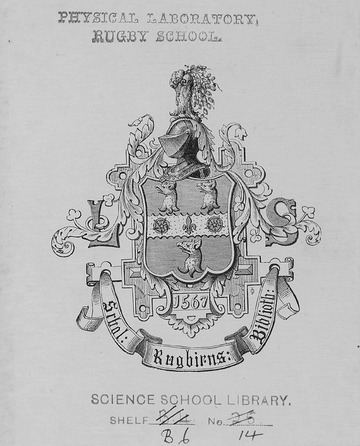
Thomas Arnold was Rugby's most famous Headmaster. He was appointed in 1828. He made many changes to the school's lessons and how it was run. Arnold's and the school's reputations became legendary through Thomas Hughes' book Tom Brown's School Days.
Arnold had three main ideas for his school. These were religious and moral principles, gentlemanly behavior, and good academic performance. He believed in "the Christian gentleman." This was a person who looked good, was playful but serious, hardworking, honest, and responsible.
John Percival
In 1888, Headmaster John Percival hired Marie Bethell Beauclerc. She was the first female teacher in an English boys' public school. She also taught shorthand for the first time in such a school. The shorthand course was very popular, with 100 boys taking the classes.
See also
 In Spanish: Rugby School para niños
In Spanish: Rugby School para niños
- List of schools in the West Midlands
- Four Rugby Boys
 | Bessie Coleman |
 | Spann Watson |
 | Jill E. Brown |
 | Sherman W. White |


